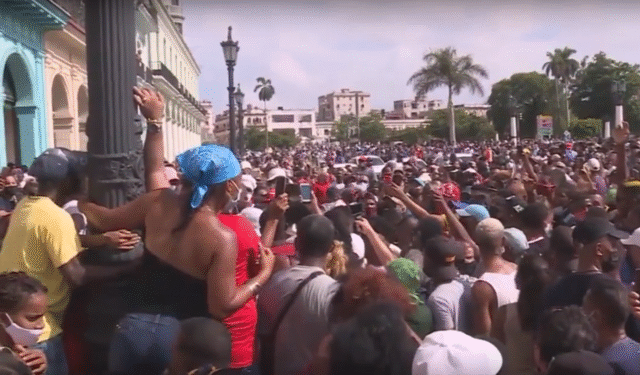After years of enduring daily hardships — from power outages and water shortages to food inflation and unreliable transportation — Cuban students have finally reached a breaking point. The trigger? A sharp, unexpected increase in mobile internet prices that many believe reflects deeper economic mismanagement and growing inequality in the country.
The discontent erupted across university campuses after Etecsa, Cuba’s state-owned telecommunications provider, quietly raised mobile data prices. The move stunned a population that has become increasingly dependent on internet access for work, education, communication, and even survival.
The Cost of Connectivity
Etecsa’s new pricing plan increased costs dramatically. While the first 6GB of monthly data would remain subsidized at 360 pesos (approximately $1 at the black market exchange rate), the next 3GB would now cost 3,360 pesos — nearly a month and a half’s salary for many Cubans, with minimum wages around 2,100 pesos (roughly $5.70).
The outcry was immediate and widespread. On campuses across the country, students from various faculties began organizing protests and issuing demands. These included boycotts of classes, formal requests for public explanations from government officials, and even calls for the resignation of the president of the Federation of University Students (FEU) — Cuba’s largest student body, which had long remained quiet under communist rule.
The Breaking Point
For many students, the price hike was the final straw — but not the root of their frustration. Underlying their anger is a growing sense that Cuba’s government is abandoning its socialist ideals in favor of policies that increasingly depend on the U.S. dollar and other hard currencies, while offering few opportunities for average citizens to earn them.
In recent months, Cuba has introduced more and more services that only accept foreign currency. State-run supermarkets now stock essential items but accept only dollars or euros. Fuel stations are shifting away from accepting the national currency, and rumors suggest that the electricity sector might soon follow. These changes are pushing ordinary Cubans to turn to relatives living abroad for remittances — creating a two-tiered society of those with access to foreign funds, and those without.
A Youth-Led Movement
Students at CUJAE, Havana’s top university for telecommunications and electrical engineering, released a public statement condemning the government’s economic direction. The document criticized the leadership for clinging to an “economic model that is chaotic, if not entirely absent,” and stressed that the issue wasn’t Etecsa’s management but the system in which it operates.
Tania Velázquez, Etecsa’s president, appeared on state television attempting damage control. She blamed the crisis on Cuba’s dwindling foreign currency reserves, which she said had severely limited the company’s revenue and purchasing power. But students weren’t convinced.
The Mathematics and Computer Sciences Department (Matcom) at the University of Havana responded with skepticism, demanding a public meeting with the officials responsible for the changes. Until then, they called on students to skip classes in protest.
Matcom emphasized the importance of transparency and accountability — something rarely demanded so openly in Cuba. Their statement wasn’t just a reaction to higher internet prices; it reflected growing disillusionment with the country’s broader economic and political trajectory.
The Government Reacts
Faced with mounting unrest, the Cuban government — which usually dismisses domestic criticism — took notice. President Miguel Díaz-Canel addressed the students directly, referring to them as “beloved” and suggesting that the issue was merely a “communication failure.” In an effort to ease tensions, the government announced a new subsidized internet package for university students only.
But rather than pacify protesters, the offer was met with contempt. Students at CUJAE rejected the measure as a weak attempt to “silence the student vanguard.”
Many students also criticized the increasing dollarization of the economy, which contradicts the values of Cuba’s 1959 socialist revolution. In statements and social media posts, students frequently referenced Fidel Castro and other revolutionary figures, accusing current leaders of betraying their ideals.
An Unprecedented Stand
The protests represent a rare and significant moment in Cuban politics. Since its founding in 1922, the FEU has played important roles in opposing earlier dictatorships, but it has largely remained a pro-government institution in recent decades. The sudden outburst of dissent from within such an organization underscores the depth of dissatisfaction among young Cubans today.
Michael Bustamante, Chair of Cuban and Cuban-American Studies at the University of Miami, noted that this may be the largest pushback from university students since the government abolished university autonomy after the revolution. “This kind of organized, public resistance is virtually unheard of in recent Cuban history,” he said.
Fear, Hope, and the Future
Despite their boldness, students are also aware of the risks. In Cuba, public dissent can result in serious repercussions — not just expulsion from university, but also long-term difficulties in employment and travel.
A mother of a psychology student spoke about the emotional toll this situation is taking. “I support my daughter in whatever she decides,” she said. “But I see the anxiety in her eyes. Her heart wants to fight, but her future depends on graduating.”
With just two weeks left in the semester and final exams approaching, some students are choosing to return to class — even if their demands haven’t been met. Matcom voted to resume attendance, though they said they still “do not accept the new rates as legitimate or supported by credible data.”
Yet the protest has already made history. One anonymous student described the movement as a spark that can’t be extinguished: “This has awakened something powerful,” she said. “We now have the confidence and organization to challenge everything that troubles us — now and in the future.”








